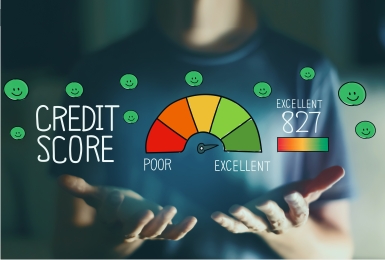One of the critical factors that lenders review and attach a great deal of importance to is your credit score. That's why maintaining a good credit score is crucial for anyone who wants to borrow a loan. A higher credit score means you are a low-risk borrower, and so comes with various benefits.
The better the credit score, the better your loan offer
With a good credit score, that is, a score above 700 CIBIL points, you are able to secure a loan deal that has better terms and conditions. This means you can possibly avail of a larger loan amount at lower interest rates. As opposed to this, a poor credit score, that is, lower than 550 CIBIL points, could even lead to your loan application getting rejected. So, it is advised that before applying for any loan, borrowers should view credit score. Upon getting your credit score, if you find it to be on the lower side, you can work towards improving the same. Here's how you can do it.
How to improve credit score
Even if you find out that your credit score is not as high as expected, there's no reason to lose hope. With better and healthy financial practices, you can improve your credit score.
1 Maintaining a good credit history
Establishing a lengthy and healthy credit history is helpful in building a good credit score. Many borrowers, however, do not have prior borrowing experience, and hence, they have no credit history. Without a credit history, your credit score will automatically be on the lower side. However, it is possible to change this situation. Consistently demonstrating responsible and on-time credit management practices can help you in building a strong credit profile, thereby improving your credit score.
2 Paying your EMI on time
The importance of making timely EMI (Equated Monthly Instalments) payments cannot be overstated when it comes to maintaining a good credit score. While this concept may seem straightforward, it carries significant implications for your overall financial well-being. When you delay EMI payments, most financial institutions ask you to pay late payment fees or penalties, which can add an extra financial burden on top of your regular instalment. Not only do you pay a financial penalty, but your credit score also takes a hit. If keeping track of payment due dates is a challenge, setting up reminders for EMI payments can be a helpful practice. Creating a habit of monitoring and adhering to payment schedules can not only prevent late payments and associated penalties but also work to your advantage in improving your credit score over time.
3 Having a low credit utilisation ratio
Exceeding your credit limit, even if you're diligent about making timely payments, can adversely affect your credit score. Maintaining a lower credit utilisation rate by utilising less credit from your available limit can be a strategic move to enhance your credit score. A credit utilisation rate below 30% is advisable. Should you find yourself consistently exceeding this threshold, you should contact your credit card company and inquire about the possibility of increasing your credit limit. This can help you have a better credit score over time.
4 Balancing your credit mix
Diversifying your credit portfolio can be a catalyst for boosting your credit score. Maintaining a balanced mix of unsecured and secured loans, spanning both short and long tenures, can contribute to a better credit score. While having a track record of successfully managing multiple loans is advantageous, it's essential to strike a balance and avoid overextending with an excessive number of loans simultaneously.
5 Not taking on too much debt
The number of loans you take in a fixed period should be reasonable. Try to take a loan and then repay the loan entirely before you take another loan. Taking multiple loans at the same time shows that you have insufficient funds and can result in a lower credit score. Taking a loan and repaying it successfully will surely improve your credit score and allow you to get a better loan.



















